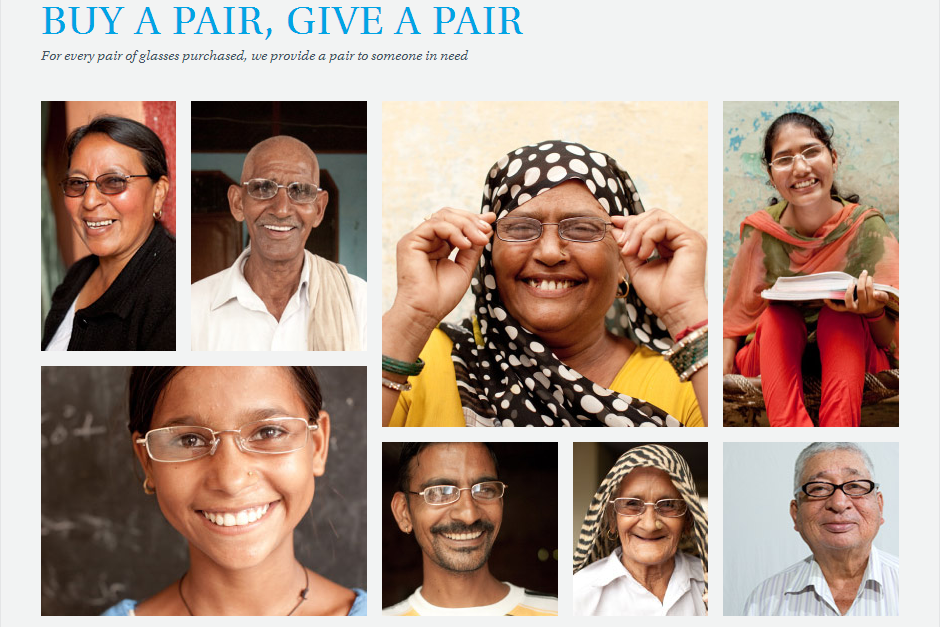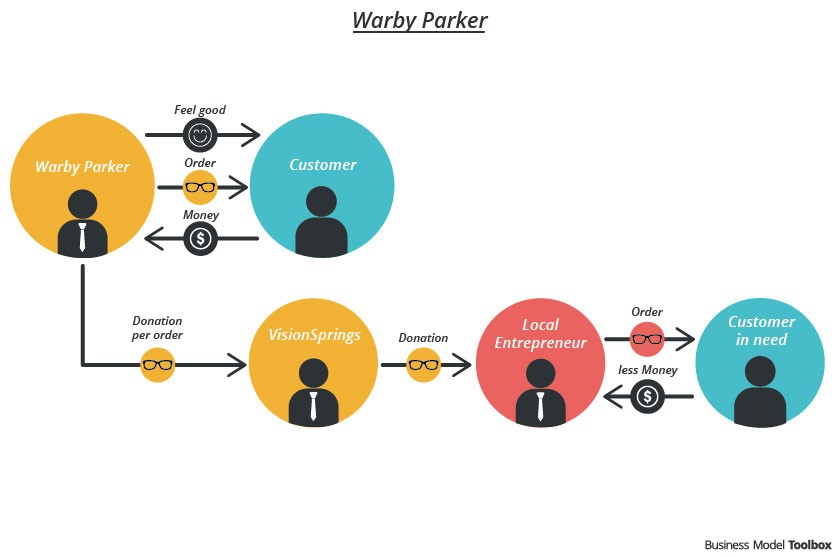Warby Parker: The next level of “one for one” CSR model


According to the research by Nielsen (2015), 66% of customers around the world would like to pay extra to reciprocate and contribute to society. Given the rising consumer awareness on being socially responsible, business models like TOM Shoe’s “One-for-one” has become a popular trend. However, such instant solution of helping people in need turned out to create long-term harm to the local society: Giveaways decreased the sales of local business, which is hardly a sustainable way of improving one’s quality of life. Seeing the loophole of this model, the New York based eyewear company Warby Parker (WP) demonstrated a win-win solution.
Instead of giving their glasses away, WP provides a more sustainable way of improving society. After becoming the distributor of Vision Spring, WP will donate one pair of glasses to Vision Spring for each purchase. Different from the “One for One” model, the donated glasses will be supplied to the collaborated merchant in the developing countries and sold at an affordable price. The campaign also included training of basic eye exam for the locals. Every pair of glasses can increase 35% of local productivity and 20% of monthly income, as reported by VisionSpring (Warby Parker, 2021). By the end of 2019, over seven-million pairs of glasses were donated (Warby Parker, 2019). Besides of sales-boosting, the implementation of horizontal corporate social responsibility assisted the targeted locals to improve their eyecare system and quality of life fundamentally.

(Source: “Buy a Pair, Give a Pair” Program)
While the collaboration with Vision Spring was outstanding, WP takes charity to the next level by launching Pupils Project. Vision disability is the most common disabling condition among children in the U.S: WP noticed the monopoly of the eyewear industry in the U.S, resulting in the unaffordable price of glasses and the lack of eyecare for those who can’t afford it. As a result, WP lined up with local organizations and government deputies to provide free eyecare services. Middle, and high school students from New York, and Baltimore to Philadelphia, were supported with vision checks, eye exams, and free glasses. In Philadelphia, at least 25,000 students benefitted the eyecare services and 4,500 pair of prescription glasses were given out during the school year of 2019-2020 (Warby Parker, 2019). Although giveaway might harm the local business, the monopolized eyewear industry in America provided a good reason for WP to break the cycle to allow more people to access eyecare services.

(Source: Business Model Toolbox, 2021)
The many examples of “one-for-one” campaigns reflected that goodwill does not necessarily lead to a good ending. Those companies observed the success of Toms Shoes might have overlooked that possible threats that come along. Standing from the point of view of the customers and the beneficiaries allows the company to launch the most useful, thoughtful, and practical campaign. In fact, one of the owners of WP once experienced losing a pair of USD500 glasses and realized the seriousness of monopoly in the American eyewear industry, which initiated the establishment of WP. Sales boosting should not be the orientation of executing corporate social responsibility, but the virtue of improving ones in need is.
Reference:
Business Model Toolbox, N. (2021). Warby Parker. Retrieved March 01, 2021, from https://bmtoolbox.net/stories/warby-parker/
Nielsen. (2015, October). THE SUSTAINABILITY IMPERATIVE [PDF].
The Nielsen Company. Retrieved March 01, 2021, from https://www.warbyparker.com/buy-a-pair-give-a-pair
Warby Parker. (2019). Impact report 2019 [PDF]. Warby Parker. Retrieved March 01, 2021, from https://www.warbyparker.com/assets/img/impact-report/Impact-Report-2019-d.pdf
Warby Parker. (2021). Buy a PAIR, give a pair. Retrieved March 01, 2021, from https://www.nielsen.com/wp-content/uploads/sites/3/2019/04/Global20Sustainability20Report_October202015.pdf
